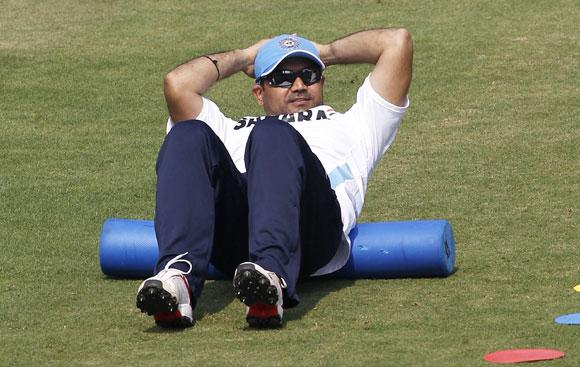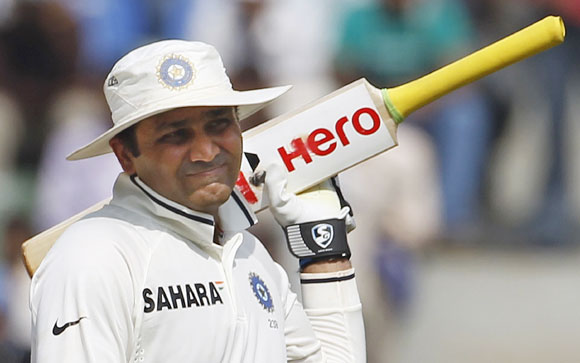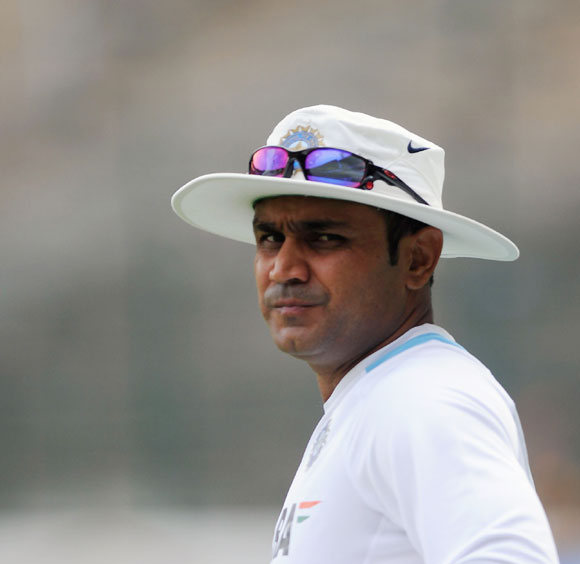Virender Sehwag, whose differences with captain Mahendra Singh Dhoni came to fore during last year's Australian tour, appeared to take a jibe at the skipper when he said the World Cup was won because India had a strong team.
"Dhoni got a very strong team. When you get a strong team, it is easier to perform well just like Australia did at one point of time. Australia won three World Cups because they had a strong team and not just because of the captain. We believe we have a very strong team and that's why we won World Cup, backed by Dhoni's captaincy," Sehwag said.
He was reacting to questions on Dhoni's strengths that enabled him lead the side to two World Cup victories -- 2007 Twenty20 and 50-over in 2011.
Dhoni and Sehwag's relationship has been a subject intense speculation in the media, particularly after the series in Australia, where there utterances in press conferences made their rift public.
'There is no fitness issue now'
Sehwag said he has no fitness concerns now and is all geared up for the Lanka tour, starting July 21.
"I played almost all the matches in Indian Premier League and there is no fitness issue now. The ODI tour of Sri Lanka will also help me in preparing for the Twenty20 World Cup to be held there," he added, at the inauguration of Saba Karim Genesis Pro-Cricket Centre in Noida.
Sehwag is also not unduly concerned by the fact that India's next generation of young batsmen did not do well in first class matches during the recent 'A' tour of the West Indies.
"Before I became a prominent member of the senior team I have also gone for 'A' tours. Some people get runs on this kind of tours and some don't. That does not mean that those who fail are not good enough. The best part is that you can make mistakes and learn from it, try to rectify in your domestic cricket and come back stronger," he said.
'We generally play well in Sri Lanka'
Recently, Rahul Dravid had expressed his apprehension about the future of Test cricket 10 years down the line but Sehwag said that the longest form of the game is not in danger.
"You ask any youngster and he would always tell you that he wants to be successful in Test cricket. You will see cricketers retiring from ODIs to prolong their Test career but you will never see a cricketer retiring from both Test and ODI to play only Twenty20," he said.
Sehwag was of the view that the two-and-a-half months break after the Indian Premier League season five will hold the Indian cricket team in good stead in the upcoming limited overs series in Sri Lanka.
"We generally play well in Sri Lanka. We have a good record there. We had a good rest (before the Sri Lanka series) so the team will be in top shape," Sehwag said after inaugurating the Manav Rachna Cricket Academy in Faridabad later in the day.
'I won't like to comment on Chappell's statement'
During the upcoming tour of Sri Lanka, India will play a five-match ODI series between July 21 and August 4 followed by a one-off Twenty20 international on August 7.
Asked Sehwag about his views on former India coach Greg Chappell's recent statement that some team members were working against Rahul Dravid when he was the captain, he refused to be drawn into the controversy.
"I won't like to comment on the issue," Sehwag said.
Chappell, who has written in Rahul Dravid -- Timeless Steel which is a compilation of articles by different authors about the former cricketer, has claimed that despite Dravid guiding the Indian team to a number of victories, his success was not enjoyed by some of his team-mates.





Comment
article